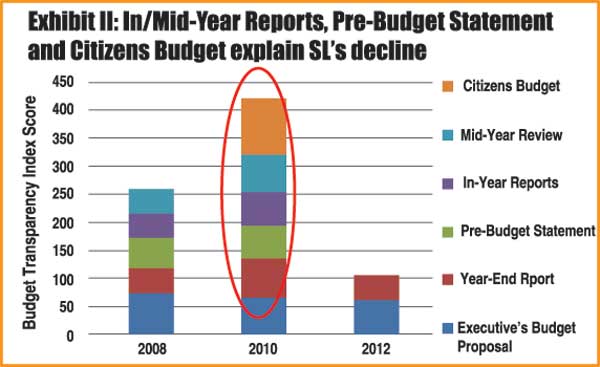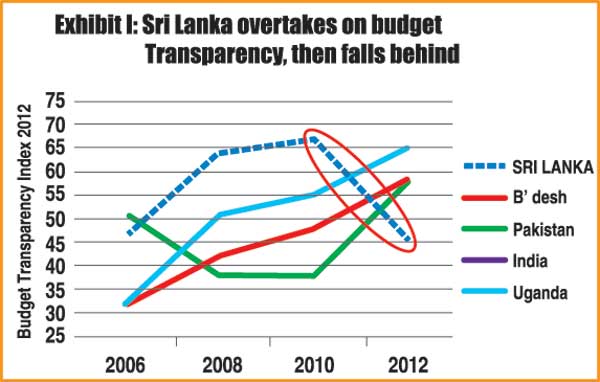Reply To:
Name - Reply Comment
.jpg) The Appropriation Bill was tabled in Parliament earlier this month and debates on Budget 2014 will dominate Parliament from now till the year’s end. But the value of these debates to the country will depend on the integrity of consultation and information reflected in the Budget documents and related reporting. This is what is captured in the Budget Transparency Index.
The Appropriation Bill was tabled in Parliament earlier this month and debates on Budget 2014 will dominate Parliament from now till the year’s end. But the value of these debates to the country will depend on the integrity of consultation and information reflected in the Budget documents and related reporting. This is what is captured in the Budget Transparency Index.
Much has been made in Sri Lankan media of various stakeholders being transparently consulted, by no less than the President himself, in the preparation of the Budget. But indications are that reality and claims are moving in opposite directions. Over the last two years, Sri Lanka’s rank on the Budget Transparency Index nosedived from 13th to 53rdin the world.
Falling Budget transparency has all kinds of pernicious effects but this insight will highlight two – falling Budget transparency is linked to decreasing efficiency of government expenditure and can increase Sri Lanka’s borrowing costs.
Sri Lanka backslides while its neighbours rise
Sri Lanka was the ‘worst performer’ between 2010 and 2012 on the Budget Transparency Index, published by the independent International Budget Partnership. Sri Lanka’s Budget transparency, on par with Germany in 2008, is now below all its South Asian Association for Regional Cooperation (SAARC) neighbours. In 2010, Sri Lanka was ahead of its neighbours Bangladesh, Pakistan and India. But by 2012, it has fallen behind all of them.
Sri Lanka’s score took a nosedive between 2010 and 2012 - the primary reason for its decline in rank. All other economies in Exhibit I improved their score considerably. While it may seem like Sri Lanka’s falling rank can be explained by its neighbours’ improvement, an important observation is that even if Sri Lanka had preserved its 2010 score, it would still be ahead of all the countries in Exhibit 1 (except India).
Even Uganda, where political power has been consolidated in the Executive in ways that Sri Lanka has mimicked, has improved consistently over the years, while Sri Lanka has declined. So, Sri Lanka’s fall in rank should be attributed due to its own poor performance, as opposed to its neighbours’ performing well.
Failing to publish causes decline
Sri Lanka’s decline on the Budget Transparency Index is almost entirely caused by failing to publish key reports. Exhibit II shows that this decline was almost entirely .jpg) caused by falling scores on the ‘Pre-Budget Statement, Mid-Year Review and In-Year Reports’. That is, the scores on the highlighted section of the bar chart.
caused by falling scores on the ‘Pre-Budget Statement, Mid-Year Review and In-Year Reports’. That is, the scores on the highlighted section of the bar chart.
Looking deeper, these scores fell as the ‘Pre-Budget Statement’ (published by 73 countries out of 101), ‘Mid-Year Review’ (published by 56 countries) and ‘Citizen’s Budget’ (a government publication of the Budget in a manner that is accessible to the layman, published by 26 countries), were not printed in 2012. It also fell because ‘In-Year Reports’ (published by 96 countries) were published late and thereby did not serve their function.
Poor Budget transparency increases borrowing costs
Budget opacity increases borrowing costs for Sri Lanka’s government and business. Research by the International Budget Partnership, using controlled regression techniques, found that Budget transparency had a significant effect on country ratings. Country ratings determine a country’s cost of borrowing. In fact, a study by the New York Federal Reserve Bank found that 92 percent of the variation in interest rate spreads on sovereign debt is explained by the country rating. Therefore, Sri Lanka’s decline on Budget transparency could help explain its high borrowing costs.
Sri Lanka’s current one-year sovereign debt yields are just over 10 percent. In contrast, Thailand and Malaysia borrow at just below 3 percent; Vietnam borrows at 6.5 percent and India at 8.5 percent. As debt servicing accounts for almost 50 percent of government expenditure and over 100 percent of government revenue, higher borrowing costs substantially reduce the money the government can spend on education, healthcare and infrastructure investment.
Budget transparency also has a direct effect on Sri Lankan companies that borrow from international markets, including banks. Their credit ratings are heavily influenced by Sri Lanka’s country rating. Therefore, if Sri Lanka’s country rating deteriorates, their corporate debt rating is likely to decline too, increasing their costs of borrowing.

Bridging gap between rhetoric and action
Sri Lanka’s waywardness in Budget-related information affects both citizens and investors more fundamentally as well. It means that people can be deeply misled about what their government is doing. One such issue was captured in the Verité Research’s report, ‘Budget 2013: Increasing Assistance and Vulnerability’. To quote:
“Section 36.8 of the Budget [2013] speech states as follows:
‘I will assure children and parents of this nation through this August assembly that this government under no circumstance will compromise its commitment to deepen the scope of free education. In this background, it has been proposed to increase expenditure on education … by a further 15 percent to about Rs.177.6 billion in 2013.’
But in fact, the Budget allocates just Rs.163.4 billion instead of the promised Rs.177.6 billion for education. This represents a nominal increase of only 5.9 percent and a reduction in of the education budget in real terms. The claim of ‘not compromising on commitment to deepen the scope of free education’ is almost directly contradicted. Either there has been an error in apportioning the budget, or the claim is deeply cynical.”
Verité Research’s report, Budget 2013 also highlighted the Treasury’s consistent and significant overestimation of revenue and underestimation of expenditure. It discussed how parliamentary oversight has weakened as the Budget enables the Finance Minister to allocate funding from the consolidated fund to areas other than those approved by the Budget, without seeking ratification from Parliament.
Furthermore, various undertakings in the Budget speech do end up never being implemented, as they are not brought into force by the speech but by subsequent regulations and legislation, which is not enacted. Mid-year and quarterly reports could mitigate the problem by at least allowing for retroactive explanations and creating some transparency on compliance.
In economics-speak, there is a principal-agent problem that is exacerbated by the lack of information. The problem for citizens and investors is that in the absence of a ‘Citizens Budget’ (with the actual allocations) and ‘In Year Reports’ (that show actual disbursement, not just the plan) they will not be wiser to the true actions of the government.

Budget 2014: Needs more than words
Instruments such as the Budget Transparency Index shouldn’t be looked at like a game of racing cars. It’s not simply about who is overtaking who. But the trends and the underlying data help us identify and reflect on some of the deeper issues that exist in economic management, as done by this Insight. The gap in citizen and investor understanding, initiative and confidence caused by poor Budget transparency, as well as increased costs in international borrowing through exposure on these failures, remain deeply important. They are in need of resolution on the brink of the 2014 Budget.
(Verité Research provides strategic analysis and advice for governments and the private sector in Asia)